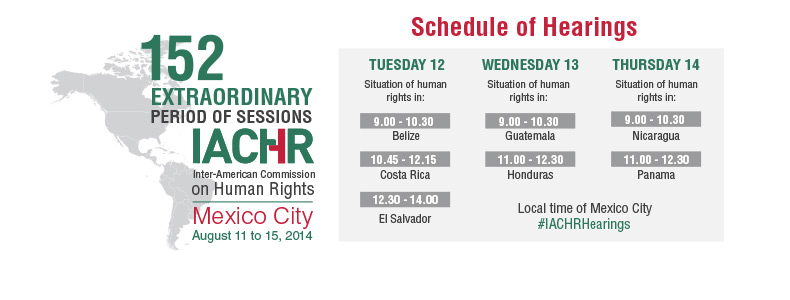 This week, the Inter-American Commission on Human Rights (Commission) will hold its 152nd Extraordinary Period of Sessions in Mexico City, Mexico, to focus on the general human rights situation in the countries of Central America. [IACHR] These hearings will be the first in seven years to be held away from the Commission’s Washington, D.C. headquarters. In light of the controversial reform process of the past few years, the Commission seems to be striving to make itself increasingly accessible to the public and to emphasize that its mandate includes all of the Americas. On the dates surrounding the session, the Commission will host a workshop on the Inter-American human rights system and help present the Mexican Supreme Court’s new guidelines for judges in cases concerning sexual orientation and gender identity.
This week, the Inter-American Commission on Human Rights (Commission) will hold its 152nd Extraordinary Period of Sessions in Mexico City, Mexico, to focus on the general human rights situation in the countries of Central America. [IACHR] These hearings will be the first in seven years to be held away from the Commission’s Washington, D.C. headquarters. In light of the controversial reform process of the past few years, the Commission seems to be striving to make itself increasingly accessible to the public and to emphasize that its mandate includes all of the Americas. On the dates surrounding the session, the Commission will host a workshop on the Inter-American human rights system and help present the Mexican Supreme Court’s new guidelines for judges in cases concerning sexual orientation and gender identity.
The agenda for this session includes a thematic hearing on the human rights situation in each country, as follows:
- Tuesday, August 12th: Belize, Costa Rica, and El Salvador
- Wednesday, August 14th: Guatemala and Honduras
- Thursday, August 14th: Nicaragua and Panama
The hearings will be webcast live on the Commission’s website, and archived videos will likely be available in the hearings database at a later date. Individuals may register in advance to attend the hearings in person.
In July, the Commission invited States and civil society to submit information concerning human rights conditions in Central America and also welcomed civil society organizations’ requests to participate in the hearings. The agenda includes a full list of scheduled participants.
The Commission typically holds three sessions per year, two of which include public hearings, at its headquarters in Washington, D.C. Its most recent hearings outside of Washington were in Paraguay, in 2007, and in Guatemala, in 2006. [IACHR]
The Inter-American Commission on Human Rights is charged with monitoring, promoting, and protecting human rights in the 35 Member States of the Organization of American States. To learn more about its mandate and work, visit the IJRC Online Resource Hub.
